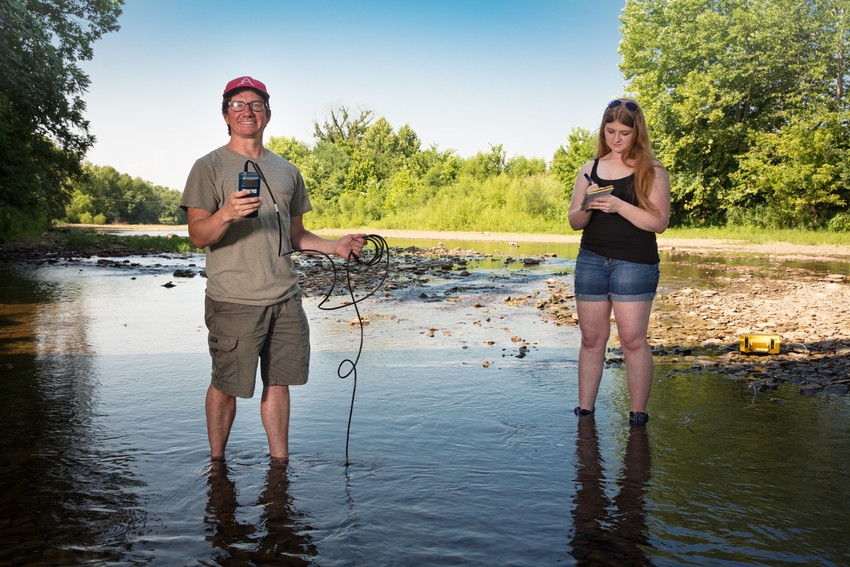
Every body of water has a story. Geosciences doctoral candidate Joshua Blackstock has dedicated his dissertation research to understanding those complex and ever-changing stories.
"I've always had a love of water," he said. "From small spring seeps to the likes of the Mississippi River, water carries a great deal of information about the landscape. A stream's chemistry can be affected by land-use, biologic activity and even magma within Earth's interior. The chemical evolution of streams can make for a fascinating and oftentimes interdisciplinary story."
Blackstock, a Doctoral Academy Fellow, has focused his doctoral research on analyzing, in part, carbon dioxide concentrations in streams near geothermal areas. Early on in his research, he discovered that adequate, low-cost dissolved carbon-dioxide assessment tools for streams did not exist. So, he and researchers from professor Matthew Covington's Research Group created their own dissolved carbon-dioxide monitoring platforms.
The device, which has yet to be named, measures the amount of dissolved carbon dioxide present in bodies of water at hourly intervals. Knowing how much and how fast the carbon dioxide concentration varies through time allows scientists a more detailed picture of carbon-dioxide variability. This process was both cost and time intensive using previous methodologies.
"Dissolved carbon dioxide in water can provide us with unique information about the stream environment that your typical major ion chemistry cannot," Blackstock said. "Changes in dissolved carbon dioxide may impart significant impacts on water quality in ecosystems. Hourly measurements made using more conventional methods are a serious cost and logistical hurdle. Without the hourly dioxide measurements, assessment of the biologic and geologic factors that influence stream chemistry are more difficult."
When developing the carbon-dioxide sensing device, it was important to Blackstock to keep the costs to a minimum and ensure the parts are readily available.
"It's important to keep the cost low and accessibility of parts high," he said. "I think this promotes a better chance of adoption within the research community, but also its potential for use in STEM education."
Blackstock and the Covington Research Group designed the device with the everyday scientist in mind. Blackstock is currently developing a set of "Ikea-like" assembly instructions, so anyone from the at-home hobbyist to the student or to the professional researcher can all assemble the device with ease. He recently led a workshop on building the device at the University of Idaho. Researchers across the STEM fields attended the workshop. Seeing his colleagues enjoy and make use of the device has been satisfying for Blackstock.
"I'm proud of what we've developed so far, and it's so exciting to hear how one group to another will use the method," he said. "It'll be interesting to see where it goes in the community. For my research, it opened up a new and novel way of testing my hypotheses."
Blackstock, a native of Pine Bluff, is advised by geosciences research professor Phillip Hays and worked closely with geosciences associate professor Matthew Covington and his research group on developing the carbon dioxide sensing device. He holds a bachelor's degree in geology from the University of Arkansas at Little Rock and a master's degree in geology from the University of Canterbury in New Zealand. Blackstock is on track to complete his doctoral degree at the University of Arkansas in spring 2019.
Topics
Contacts
Amanda Cantu, director of communications
Graduate School and International Education
479-575-5809,